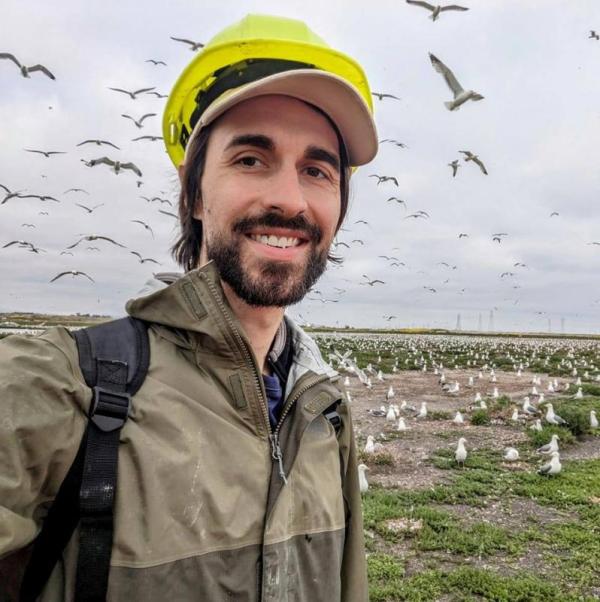Scientist Nathan Van Schmidt of the San Francisco Bay Bird Observatory (SFBBO) talks about his research on the challenges facing waterbirds of the Pacific Flyway within the Restoration Project. He digs into over two decades of monitoring data on ten foraging guilds including shorebirds, ducks, gulls, terns, fisheaters, and more for areas within Restoration Project boundaries and at nearby remaining commercial salt-production ponds. Over a million waterbirds utilize San Francisco Bay for migratory stopover or over-wintering habitat each year, including many species which have already lost substantial habitat elsewhere within the Western United States. Their habitat needs complicate efforts to restore tidal marsh throughout the Bay Area, and a careful design of a balanced mosaic of habitats may be necessary to ensure the diverse species' persistence.
- See video of presentation.
- See and download presentation slides.
- Read Nathan's July 2024 blog post on phalarope foraging.
Speaker Bio: Nathan Van Schmidt is a Science Director at San Francisco Bay Bird Observatory (SFBBO), running their Waterbird and Climate Change research programs. A native of the Midwest, he obtained his B.S. from University of Wisconsin - Madison and moved to the Bay Area in 2011 to obtain his PhD at U.C. Berkeley, where he studied how anthropogenic wetlands allowed Black Rails to persist through California's droughts. He has worked as a researcher in the U.S. Geological Survey, U.C. Santa Cruz, and the International Crane Foundation. In his current role he leads monitoring and research on the Project's non-breeding waterbird guilds, community scientist monitoring of colonial waterbird breeding activity across the nine counties of the Bay Area region, waterbird disease and abatement research, and is the Lead Author of the Central Coast Regional Report for California's Fifth Climate Change Assessment. His interdisciplinary research couples long-term field ecology datasets on bird populations and their habitats with climate and land-use change forecasting to assess how species persist in human-dominated landscapes.
Further Info on Presentation: Nathan highlights the divergent responses of different guilds, trying to disentangle why some guilds have benefited from changes to pond management while others face worrying declines. The latter half of his talk dives deep into the ecology of two unique shorebirds with specialized habitat needs within the Project: Wilson's Phalaropes and Red-necked Phalaropes, the former of which was recently petitioned to be listed under the Endangered Species Act due to threats to saline lakes across the Great Basin. The talk concludes with a discussion of the outstanding key research questions and next steps that SFBBO plans to address these conservation science needs.
Scientific Question
How have populations of the ten foraging guilds of non-breeding waterbirds changed over the course of the Restoration Project, and what habitat and climate changes have driven these changes in their populations?
Lunch and Learn Science Speaker Series
This presentation is one in a series put forth by the South Bay Salt Pond Restoration Project. The series addresses science and adaptive management done in support of or in collaboration with our Restoration Project as well as relevant outside work. Speakers discuss research, modeling, and monitoring efforts and how Restoration Project managers are using science to inform decisions about restoration, flood risk management, and public access.
Future Lunch and Learn Presentations
You can check the Events Page for later presentations, to register and find info. Future topics include:
- April: Breeding Waterbirds



